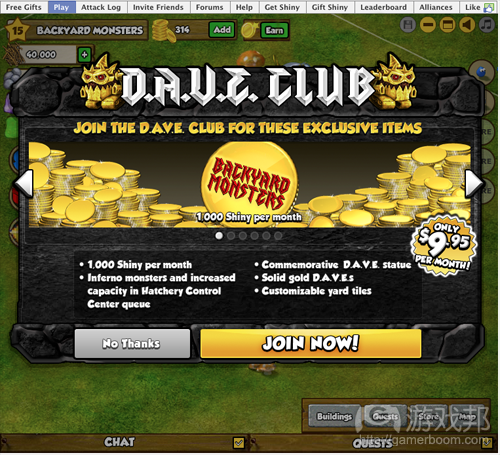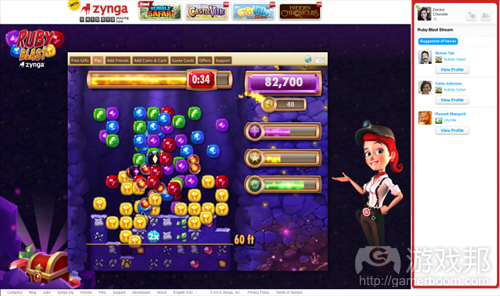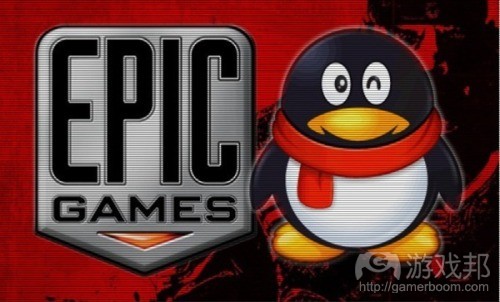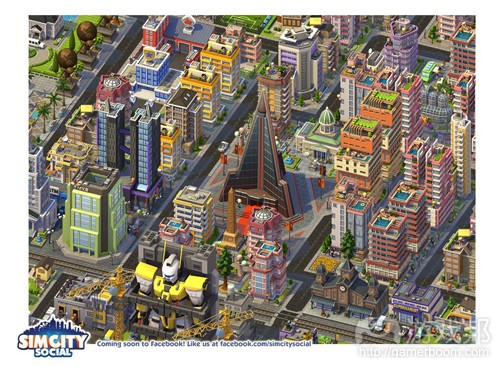每日观察:关注Facebook开放订阅付费服务(6.20)
1)据insidesocialgames报道,Facebook日前宣布将于7月份推出一项订阅付费服务,支持开发者为用户提供包月服务,如果用户订阅某款游戏,Facebook仍将从中抽成30%(游戏邦注:在此之前Facebook支付系统并不支持这种包月服务,除非开发商与Facebook直接合作)。
Facebook称这项订阅服务已经支持使用本地货币计费,并计划在未来数月支持IAP本地货币计费服务。
这项订阅服务已在Kixeye《Backyard Monsters》及Zynga的数款游戏进行测试。例如,包月玩家在《Backyard Monsters》中可以访问“D.A.V.E. Club” ,从中获得1000个虚拟货币Shiny,获取特殊怪物和道具。
这并非Facebook首次试验游戏订阅服务,Facebook Credits团队曾在去年表示当时鲜有北美公司采用其订阅服务,但在其他地区却获得了一定成功。
2)Zynga日前宣布公司即将推出的最新项目是连线消除游戏《Ruby Blast》,这也是继《Bubble Safari》之后的第二款Zynga社交街机游戏。该游戏是Zynga西雅图和中国工作室首次合作的产品,玩法类似于《宝石迷阵3》中的Diamond Mine模组,支持玩家通过每周竞争排行榜挑战好友的高分,位居排行榜前三甲的玩家可以赢得虚拟货币等游戏奖励。
据其设计总监Jonathan Grant所称,计划在该游戏中植入同步多人模式,并希望游戏视觉效果有别于其他Facebook连线消除游戏。
3)据games.com报道,社会公益游戏倡导组织Games for Change日前宣布,Zynga成员将协助《口袋上帝》Facebook版本开发商Frima Studio制作一款社交游戏《半边天》(Half the Sky)。
该游戏取材于普利策奖获得者Nicholas Kristof和Sheryl WuDunn的同名小说,也是一个旨在“倡导全球女性权益”的跨媒体项目,将由Games for Change担任其执行制作人,预计于今年11月13日发布游戏。
4)据gamasutra报道,社交游戏公司Kabam日前收购MMO游戏《Realm of the Mad God》开发商Wild Shadow Studios(游戏邦注:《Realm of the Mad God》联合开发者SpryFox工作室已出售其持有的该游戏股份)。
《Realm of the Mad God》在2010年是以独立游戏大赛作品身份面世,后来扩展成为完整版MMO游戏,通过其官方网站和Steam平台运营游戏。
该游戏设计师Willem Rosenthal仍将留在团队推动项目向前发展,其开发团队表示这次收购可让他们获得更多扩展游戏的资源。
5)PricewaterhouseCoopers最新报告预测,2012年新加坡玩家在手机及网络游戏中的投入将达1.5亿美元,到2016年这一数据将增长至3.03亿美元,复合年增长率达10.9%,超过全球的平均增长率(7%)。
6)据gamasutra报道,腾讯日前宣布收购虚幻引擎开发公司Epic Games少数股份,但并未透露具体成交金额。Epic总裁Michael Capps表示,他们将与腾讯合作挖掘中国用户市场。
据称腾讯今年第一季度在整个中国网游市场所占收益超过三分之一,这并非腾讯首次向西方游戏公司进行的大笔投资,在去年该公司还收购了《英雄联盟》开发商Riot Games的多数股份。
7)据games.com报道,EA新社交游戏项目《模拟人生社交版》制作人Pete Lake在最近采访中表示,他们将为玩家创造全新的“社交城市建设2.0”游戏体验。
他指出玩家在游戏中建设的是充满生机和灵魂的城市,城市发展比其他城建游戏更为自然,如果引进更多景点和装饰物就能吸引更多居民,但城市发展过程必将伴生火灾、犯罪等现象,玩家需妥善处理这些问题。
玩家还可以访问好友的城市,与多种友善或恶作剧方式与其互动,并互赠解琐奖品和特殊礼物。(本文为游戏邦/gamerboom.com编译,拒绝任何不保留版权的转载,如需转载请联系:游戏邦)
1)Facebook reveals game subscriptions with monthly billing
Mike Thompson
Facebook just announced an upcoming subscription payments service, giving developers another potential revenue stream beyond the sale of virtual goods.
The new feature allows developers to provide players with a premium game experience in exchange for a monthly fee. Facebook will still keep the usual 30 percent fee if a player opts to subscribe to a game. Previously, Facebook’s payment system wasn’t set up to support subscription billing unless a developer worked directly with the social network. Facebook says subscriptions already use local currency pricing and that it plans to release local currency support for in-app payments within a few months. Likewise, any games with virtual items for sale are going to be required to use local currency pricing by the end of the year.
As of now, subscriptions are being tested in Kixeye’s Backyard Monsters, as well as titles by Zynga. In Backyard Monsters, subscribing gives players with access to the “D.A.V.E. Club,” which provides in-game bonuses like 1,000 Shiny (the game’s hard currency), access to special monsters and vanity items for a player’s base. We reached out to Zynga about what kind of rewards subscriptions will provide in its games; a Zynga spokesperson didn’t provide us with a details about this, but did say the company believes the feature will streamline payment methods and offer more flexible pricing options for its Facebook titles.
Kixeye’s VP of Marketing John Getze tells us the developer feels the subscription model is a way to reward loyal and engaged players, since the $9.99-a-month price tag is the normal cost for Shiny in the game. However, Getze says Club D.A.V.E. is also a way to use in-game incentives to rope in new paying users. Kixeye will wait to see how the model performs on the Facebook version of the game before it makes any official decisions about using subscriptions in other games like War Commander or Battle Pirates. When asked if Kixeye plans to bring the subscription feature to the upcoming mobile version of Backyard Monsters, Getze says it’s to be determined, but “I can’t see why we wouldn’t do it.”
Paid subscriptions are a staple of mainstream massively multiplayer games, and having a subscription model in place could make Facebook a tempting target for developers of free-to-play browser-based massively multiplayer online role-playing games. Until now, few F2P MMORPGs have been launched for Facebook, and the genre hasn’t caught on with a widespread audience. That said, IGG recently launched Moonlight Online (although that title doesn’t seem to have a subscription option yet), and other developers like Bigpoint, Sony Online Entertainment and Runescape developer Jagex Game Studio may have much more of a reason to start bringing some of their games to the Facebook canvas.
This isn’t the first time Facebook has experimented with game subscriptions. Last year, the Facebook Credits team told us about a situation where a developer was using a subscription model and needed extra help implementing a recurring pay cycle. At the time, the team said the subscription model wasn’t being used by studios in North America, but it was seeing some success in other territories.
The Facebook developer blog says the feature will launch for all developers in July.(source:insidesocialgames)
2)Zynga gets in on the match-3 game with Ruby Blast
Mike Thompson
Zynga’s next arcade title, as our sources told us, is a match-3 game called Ruby Blast.
Ruby Blast is Zynga’s second social arcade game in as many quarters; the first being Bubble Safari, which is currently tied with Texas HoldEm Poker as the No. 1 game on Facebook by daily active users. Ruby Blast is the first collaboration between Zynga Seattle and Zynga China. We got to spend some time with the game in a hands-off demo during a recent interview with Design Director Jonathan Grant.
Ruby Blast stars an archaeologist named Ruby digging for magic gems in a tropical mine. The gameplay features classic match-3 mechanics: Players click on clusters of at least three matching gems, clearing them and causing the leftover columns to drop down. Bedrock at the bottom of the screen can be demolished by clicking on adjacent bomb gems, clearing all of the rocks delivers a time bonus.
Each match costs energy to play, and players can spend soft currency on up to three powerups to use during the round. When Ruby Blast launches, there will be four different powerups, but a fifth is coming soon. Each powerup provides different types of play bonuses — like clearing large areas of gems or rearranging the game board — and can be triggered once players fill an energy bar on the right side of the screen, accomplished by clearing gems of the same color.
Grant says the game’s social mechanics are designed to foster competition with their friends. Player experience is earned by collecting rubies in the game, which are tracked via the game’s ruby leaderboard. Ruby Blast also has weekly tournament leaderboards, where players compete with their friends to earn high scores in the game. The weekly tournament leaderboards will clear each week and the top three scoring players earn in-game rewards like extra currency.
Match-3 games are certainly popular on Facebook right now, with Wooga’s Diamond Dash, PopCap’s Bejeweled Blitz and King.com’s Candy Crush Saga all appearing on June’s Top 25 Facebook games list. What could help Ruby Blast stand out from the match-3 crowd, though, is its planned synchronous multiplayer mode. Grant won’t say much more about this mode, but he says it’s planned to launch in the game before the end of the year.
Zynga’s also hoping that Ruby Blast’s visual style distinguishes it from other match-3 games on Facebook. Zynga developed the game in Flash 11, allowing the developer to take advantage of Stage 3D technology. As a result, all the in-game special effects will be rendered by the computer’s GPU and the dynamic graphics will hopefully be more appealing to players than the pre-rendered effects that are normally used in such titles.
Ruby Blast is will launch on both Zynga.com and Facebook sometime later this week.(source:insidesocialgames)
3)Zynga helps Pocket God Facebook creator make a game for change
by Joe Osborne
Between pumping out Facebook and mobile games like it’s no body’s business, Zynga finds the time to do its fair share of charity work. Now, the developer looks to kill two birds with one stone, as social good games advocate Games for Change has announced that Zynga will lend (more than) a few hands to Pocket God (on Facebook) maker Frima Studio in crafting Half the Sky, a social game for social good.
Based on the novel of the same name penned by Pulitzer Prize winners Nicholas Kristof and Sheryl WuDunn, the Half the Sky Facebook game is one piece in a trans-media project aimed to “put an end to the oppression of women and girls worldwide,” according to the movement’s mission statement. Games for Change will serve as an executive producer of the Half the Sky game, while a number of Zynga staffers will help Frima Studio finish it.
“Helping others is so embedded in social games that engaging players to help address real-world issues seems like a natural extension of game play,” Zynga.org executive director Ken Weber said in a release. “Zynga’s employees are eager to leverage social games for good and we are honored to be collaborating with Games for Change and Frima on this important initiative.”
With Zynga and one of the most talented independent social game studios around collaborating on a social game for social good, it will be–dare we say–exciting to see the results. Half the Sky is due out on Facebook this Nov. 13.(source:games)
4)Kabam acquires Realm of the Mad God developer
by Mike Rose
Wild Shadow Studios, the team behind popular indie MMO Realm of the Mad God, has been acquired by social games giant Kabam, while co-creator SpryFox has sold its stake in the game.
The game originally launched in 2010 as an entry into an indie game competition, and was later expanded into a fully fledged MMO, available via the official website and through Steam.
Designer Willem Rosenthal, who has been working on the game for several months, is staying on board to guide the project going forward, and the team says that the acquisition means it will be able to pull more resources into expanding the title.(source:gamasutra)
5)Spending on online and mobile games tipped to rise
By Grace Chng
The much-anticipated fantasy role-playing game Diablo III was released in Singapore last month.
Singaporeans will be shelling out about US$238 million (S$303 million) a year on mobile and Internet games such as Angry Birds and World Of Warcraft by 2016, a far higher level of spending than gamers elsewhere.
The huge outlay will be up sharply from the US$150 million or so that PricewaterhouseCoopers (PwC) estimates will be spent this year.
It represents a compound annual growth rate of 10.9 per cent, trumping the global rate of 7 per cent.
The proliferation of mobile devices like smartphones and tablets are driving the rapid expansion of mobile and online games, while spending on console games is slowing.(source:straitstimes)
6)Epic Games sells a part of itself to Chinese online giant Tencent
by Mike Rose
Major Chinese internet company Tencent has acquired a minority stake in Gears Of War and Unreal Engine creator Epic Games for an undisclosed sum.
The deal marks the first time an outside investment has been made in Epic, and Epic president Michael Capps noted that the company will be collaborating with Tencent to tap into the company’s Chinese userbase.
It’s notable that Tencent made up more than a third of all revenue in the Chinese online games market during the first quarter of the current fiscal year, through its various online platforms including the QQ.com web portal and QQ Game Open Platform.
The deal will close sometime in the next month, although the terms of the investment were not provided. Capps was also keen to stress that Epic will continue to operate independently, seeking further expansion of its current game franchises across multiple platforms.
This isn’t the first time Tencent has acquired a stake in a Western video game developer. Last year it bought a majority stake in Riot Games, Los Angeles-based developer and publisher of League of Legends.
Epic has had a relationship with Tencent for years, with the Chinese company licensing Unreal Engine for its projects. Mike Capps, president of Epic, tells Gamasutra that both firms have a lot to learn from each other, and that his company is eager to tap into Tencent’s expertise in China’s online PC and mobile games market.
“They have fantastic inroads into attractive markets and platforms, and Epic has been carefully weighing its options for the next generation of games for quite some time,” says Capps.
He adds, “Our engine powers browser-based games, mobile games, MMOs, and more. As more of China’s population is becoming connected to the internet, Tencent’s business is growing in all of these areas.”
As for whether Tencent and Epic have plans to bring the latter’s popular game brands like Gears of War to China, Capps says, “We are looking at all potential growth areas.”
Epic also owns a minority stake in Yingpei Games (formerly Epic Games China), which offers outsourcing services and recently began developing its own titles like Mercenary Ops. That developer controls its own operations, and has more than 300 employees across its offices in Shanghai and Suzhou. (source:gamasutra)
7)Why SimCity Social is ‘social city building 2.0′ on Facebook [Interview]
by Joe Osborne
“We’re offering an all-new experience for players for building: social city building 2.0,” SimCity Social producer Pete Lake tells us of EA’s next big Facebook game. A tad grandiose, but Lake’s claim is a fitting one. Playfish and Maxis aren’t reinventing the city-builder on Facebook by any stretch of the means. They want to give the genre a much-needed upgrade.
The number one social game on Facebook for what seemed like forever was industry leader Zynga’s crown jewel, CityVille. But since the city simulator fell to second place–to a poker game of all things–the validity of Facebook’s ever-popular city-builder genre is now in suspect. That’s either brilliant or terrible timing on EA and Playfish’s part, but depends entirely on the execution. According to Lake, there are two ways that SimCity Social will give the genre a version update, as it were.
“One is [that] you’re building these cities that are full of life and soul,” Lake says. “As in the classic SimCity games, you’re not placing every single building yourself. You’re growing your city over time [all the way] down to the way you want your houses. They will grow and reflect the population that’s moving into your city.”
Lake promises that the way in which players build their cities is more organic than in previous city-building games. By placing attractions and decorations in your city, more visitors become citizens. As your city’s population grows, unfortunate events will begin to occur, like fires, crime and health scares, that only you can fix. Or not–it’s entirely up to you, but you’ll have to deal with the consequences.
“The citizens in your city will react to the way you’re acting as a mayor. I can try and make them happy and build parks, so maybe I want to clean up the buildings, or maybe I want to build a fire station–or not,” Lake explains. “That’s visualized in the lives and reactions that you see minute to minute in the city, and you see the little Sims. If they’re happy, they’ll come out and start cheering and [throw] parades for you. If they’re miserable, you’ll soon know about it as well”
SimCity Social players that prefer to be a benevolent mayor will earn rewards and content that’s different from those those opt to run their city as a tyrannical mayor. For instance, evil mayors will earn buildings and decorations that show as much. In fact, the idea is for players to create a city that matches their personalities. The same goes for how players interact with their fellow mayors, a nod taken from EA’s very own The Sims Social.
“You can visit your friends … and you can interact with them in a number of different ways, whether you want to be good or a little more mischievous. So, I can go [place] cars or I can go and help plant trees in the park,” Lake explains. “These actions then build over time to form solid, lasting, changeable relationships with my friends. And all through this we’re unlocking new rewards and special gifts that we can then send to each other.”
“With social city building 2.0, [we're] offering players a way to interact with their friends in a city-playing game in a way they never have before. The city will react and live full of life and soul as they’ve never seen.” We’ll just see about that when SimCity Social launches on Facebook in “a matter of weeks.”(source:games)













































 闽公网安备35020302001549号
闽公网安备35020302001549号